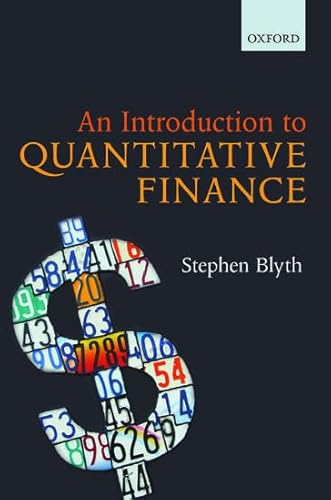Articoli correlati a An Introduction to Quantitative Finance

Sinossi
The worlds of Wall Street and The City have always held a certain allure, but in recent years have left an indelible mark on the wider public consciousness and there has been a need to become more financially literate. The quantitative nature of complex financial transactions makes them a fascinating subject area for mathematicians of all types, whether for general interest or because of the enormous monetary rewards on offer.
An Introduction to Quantitative Finance concerns financial derivatives - a derivative being a contract between two entities whose value derives from the price of an underlying financial asset - and the probabilistic tools that were developed to analyse them. The theory in the text is motivated by a desire to provide a suitably rigorous yet accessible foundation to tackle problems the author encountered whilst trading derivatives on Wall Street. The book combines an unusual blend of real-world derivatives trading experience and rigorous academic background.
Probability provides the key tools for analysing and valuing derivatives. The price of a derivative is closely linked to the expected value of its pay-out, and suitably scaled derivative prices are martingales, fundamentally important objects in probability theory.
The prerequisite for mastering the material is an introductory undergraduate course in probability. The book is otherwise self-contained and in particular requires no additional preparation or exposure to finance. It is suitable for a one-semester course, quickly exposing readers to powerful theory and substantive problems. The book may also appeal to students who have enjoyed probability and have a desire to see how it can be applied. Signposts are given throughout the text to more advanced topics and to different approaches for those looking to take the subject further.
Le informazioni nella sezione "Riassunto" possono far riferimento a edizioni diverse di questo titolo.
Informazioni sull?autore
Stephen Blyth is managing director and head of public markets at the Harvard Management Company, the subsidiary of Harvard University responsible for the management of the University's endowment. He is also Professor of the Practice of Statistics at Harvard University.
Before joining Harvard in 2006, Professor Blyth was managing director and head of the Global Rates proprietary trading group at Deutsche Bank in London, and managing director in the Interest Rate Group at Morgan Stanley in New York.
Professor Blyth is a frequent speaker at international finance conferences and has written widely on issues facing practitioners in applied quantitative finance and in derivative markets. He holds a PhD in Statistics from Harvard University and an MA in Mathematics with first class honours from Christ's College, Cambridge University, where he is a Lady Margaret Beaufort Fellow. He was formerly a Lecturer in Mathematics at Imperial College London.
Le informazioni nella sezione "Su questo libro" possono far riferimento a edizioni diverse di questo titolo.
EUR 17,16 per la spedizione da U.S.A. a Italia
Destinazione, tempi e costiCompra nuovo
Visualizza questo articoloEUR 1,92 per la spedizione da U.S.A. a Italia
Destinazione, tempi e costiRisultati della ricerca per An Introduction to Quantitative Finance
An Introduction to Quantitative Finance
Print on DemandDa: PBShop.store US, Wood Dale, IL, U.S.A.
HRD. Condizione: New. New Book. Shipped from UK. THIS BOOK IS PRINTED ON DEMAND. Established seller since 2000. Codice articolo L1-9780199666584
Quantità: Più di 20 disponibili
An Introduction to Quantitative Finance
Print on DemandDa: PBShop.store UK, Fairford, GLOS, Regno Unito
HRD. Condizione: New. New Book. Delivered from our UK warehouse in 4 to 14 business days. THIS BOOK IS PRINTED ON DEMAND. Established seller since 2000. Codice articolo L1-9780199666584
Quantità: Più di 20 disponibili
An Introduction to Quantitative Finance
Da: Ria Christie Collections, Uxbridge, Regno Unito
Condizione: New. In. Codice articolo ria9780199666584_new
Quantità: Più di 20 disponibili
Introduction to Quantitative Finance
Da: GreatBookPricesUK, Woodford Green, Regno Unito
Condizione: New. Codice articolo 19957219-n
Quantità: Più di 20 disponibili
INTRO QUANTITATIVE FINANCE C (eng)
Print on DemandDa: Brook Bookstore On Demand, Napoli, NA, Italia
Condizione: new. Questo è un articolo print on demand. Codice articolo 94d679302a77b030e7716096e5a855af
Quantità: Più di 20 disponibili
Introduction to Quantitative Finance
Da: GreatBookPrices, Columbia, MD, U.S.A.
Condizione: New. Codice articolo 19957219-n
Quantità: Più di 20 disponibili
An Introduction to Quantitative Finance
Print on DemandDa: THE SAINT BOOKSTORE, Southport, Regno Unito
Hardback. Condizione: New. This item is printed on demand. New copy - Usually dispatched within 5-9 working days 446. Codice articolo C9780199666584
Quantità: Più di 20 disponibili
Introduction to Quantitative Finance
Da: GreatBookPrices, Columbia, MD, U.S.A.
Condizione: As New. Unread book in perfect condition. Codice articolo 19957219
Quantità: Più di 20 disponibili
Introduction to Quantitative Finance
Da: GreatBookPricesUK, Woodford Green, Regno Unito
Condizione: As New. Unread book in perfect condition. Codice articolo 19957219
Quantità: Più di 20 disponibili
An Introduction to Quantitative Finance
Da: Goodwill Industries of VSB, Oxnard, CA, U.S.A.
Condizione: Good. The book is nice and 100% readable, but the book has visible wear which may include stains, scuffs, scratches, folded edges, sticker glue, highlighting, notes, and worn corners. Codice articolo 4JQZV1000794
Quantità: 1 disponibili

